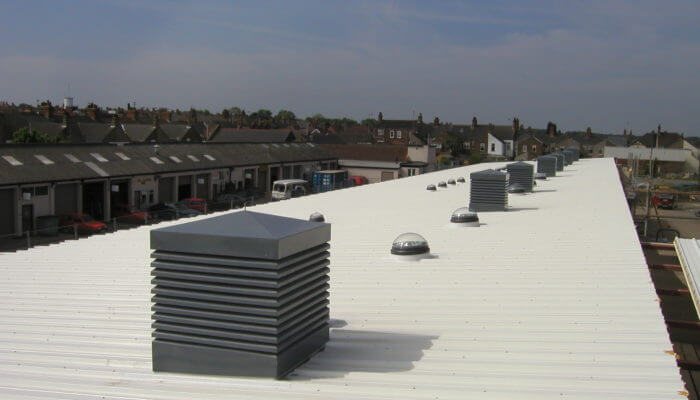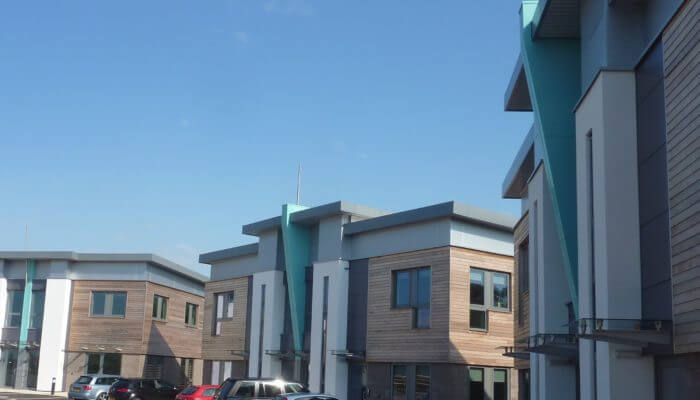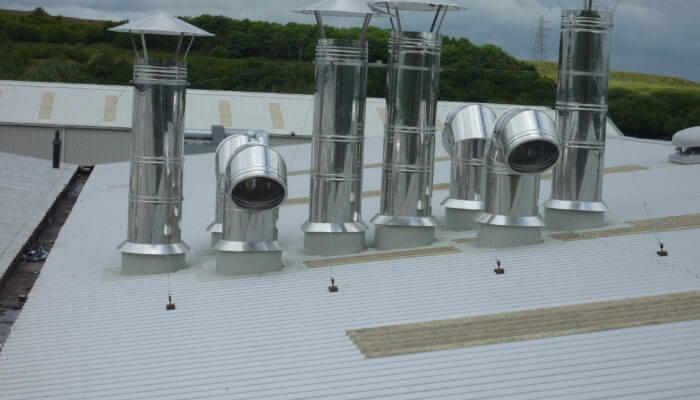Getting roof weatherproofing right is essential for any building – it protects the building envelope from damage caused by damp, rainwater ingress and wind, and it also protects the contents of the building and the building occupants.
Over the years, we’ve been called out to repair hundreds of commercial roofs, and there are several weatherproofing mistakes we often see – many of which could have been easily avoided with careful planning, expert knowledge, and a skilled hand.
Here are the six most common commercial weatherproofing mistakes we’ve seen, along with advice on how to prevent problems, mitigate damage and ensure proper repairs are carried out.
1. Neglecting maintenance
The amount of maintenance required for a commercial roof will depend on how the roof is constructed and what kind of weatherproofing is used.
Many commercial roofs are flat roofs covered with bitumen, EPDM, metal, or thermoplastics, and these require regular maintenance and inspections to check for buckling, cracking, pooling, shrinking, damage, or deterioration. Any issues will need to be addressed quickly, as it doesn’t take long for a small problem to grow into a much larger one.
However, GRP (glass reinforced plastic) roofs, also known as fibreglass roofs, require almost no maintenance. Regular cleaning is all they need to retain their appearance and durability. GRP roofs have an expected lifespan of at least 25 years, and many last much longer than that. Of course, no roofing system is entirely problem-free, so even GRP roofs should be checked regularly to ensure they’re in good condition.
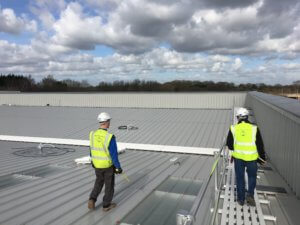
2. Not investigating underlying problems
When you notice a crack in the roof covering, discover a leak or spot a bit of pooling water on a flat roof, your first instinct may be to quickly patch up the problem and assume it’s taken care of.
However, many roof weatherproofing issues are symptoms of underlying problems. For example, pooling water could indicate a poorly designed roof, weak or damaged roof structure or, in the case of roofs covered with a hot bituminous system, improper mopping that created voids in the membrane.
If these underlying issues aren’t recognised – usually with the help of a commercial roofing expert – and properly dealt with, the problem is likely to return and increase in severity.
3. Blocked drainage or inadequate drainage
Standing water is a significant problem for commercial flat roofs for several reasons. For one thing, it adds weight, which could cause sagging and deterioration of the roof surface. For another, standing water is more likely to find its way through imperfections in the roof surface. It also encourages the growth of plants and moss.
Keeping drains, gutters, and downpipes clear is part of good roof maintenance and will help ensure water leaves the rooftop quickly and efficiently. However, other drainage problems, such as a poorly designed roof or not enough drainage, will require the knowledge and skills of an expert roofing contractor to put things right.
4. Poorly constructed roof penetrations
Commercial buildings are likely to have a variety of roof penetrations, ranging from rooflights, access hatches and lift shafts to openings for HVAC equipment, chimneys, manufacturing plant and other machinery. If these penetrations aren’t carefully planned, constructed, and weatherproofed, there will likely be problems with leaks and drainage.
Ideally, roof penetrations should be considered early in the building design process. Working with a commercial roof expert will help to ensure that the penetration is constructed and weatherproofed adequately.
However, roof penetrations are often installed after roof construction is complete – sometimes years later when the building is undergoing a change of use or refurbishment. In these cases, a roof penetrations expert can provide advice and guidance on the best locations for penetrations, the types of support required and how to weatherproof the installation for long-term reliability.
And if an existing roof penetration is suffering wind damage or rainwater ingress, an expert can provide advice and carry out remedial works to resolve the problem.
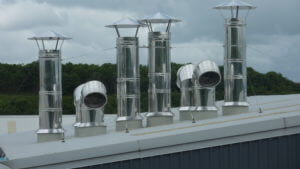
5. Improper repairs
We often see cases where previous repairs were carried out using the wrong materials or installation methods. Sometimes this simply means that the repairs didn’t work or only lasted a short time. However, a bad repair job can cause more roof damage.
For example, it’s not unusual to see metal roofs that have been patched up with caulking and plastic roof cement. These materials are not fit for purpose and are likely to fail, especially in extreme weather conditions. On single-ply membrane roofs, roof cement can damage the roofing surface, as the solvents in the cement may dissolve plastics like PVC and EPDM.
The lesson here is that if commercial roof repairs are needed, it may be tempting to DIY it or find the cheapest rate around. But it usually pays to have a knowledgeable professional survey the damage and carry out repairs that will remain structurally sound and weathertight for years to come.
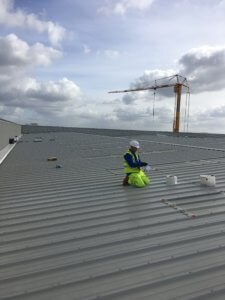
6. Not enlisting the help of a commercial roof weatherproofing expert
As we’ve already mentioned, calling in an expert with specific knowledge of commercial roof weatherproofing is the best course of action for building, repairing, or renovating a commercial roof.
Jones Weatherproofing has extensive experience in commercial roof weatherproofing, and we have worked on a wide range of projects, from shopping centres, schools and factories to data centres, airports, and sports stadia. Our cold-applied liquid fibreglass roofs provide a robust, reliable, and weathertight surface, and the system also works with all kinds of roof penetrations to provide a weatherproof seal.
We recommend getting in touch from the very earliest stages of a project. That way, we can provide advice and liaise with other teams to ensure the best results using the most straightforward methods. However, our flexible system, combined with our ability to design and build bespoke GRP components, enables us to successfully deliver reliable weatherproofing, backed by our 25-year guarantee, no matter how far along the project may be.
Get in touch to find out more about commercial roof weatherproofing, or discuss your next project with a weatherproofing expert, you can also call on 01922 712111.
